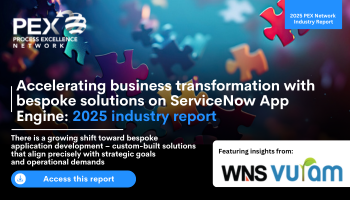Finance teams cautiously embrace AI while rethinking ROI
Report finds AI is driving new ways to assess business value across the enterprise
Add bookmark
Finance teams in the US and UK are cautiously embracing artificial intelligence (AI) while simultaneously rethinking return on investment (ROI) from AI adoption. That’s according to the AI-Powered Finance: New Practices, ROI and Future Outlook report from Emburse.
Based on a survey of 1,500 finance professionals, the report examines how finance functions are adopting AI to improve productivity and business outcomes. It found that while 66 percent of organizations have invested in AI, many are still determining how to measure its value.
As finance teams move beyond basic automation, the data suggests a growing need for solutions that connect AI to broader business strategy, using intelligence to optimize spend, reduce risk and enable faster decision-making.
Join the PEX Network community

Don't miss any news, updates or insider tips from PEX Network by getting them delivered to your inbox. Sign up to our newsletter and join our community of experts.
Learn MoreHow finance teams cautiously embrace AI
Finance departments are adopting AI at a significant yet gradual level, the report indicates. On average, respondents say they use AI 3.7 times a day with 37 percent of their tasks driven by AI to some extent. Over the next five years, they expect AI to transform planning and forecasting the most (26 percent).
What’s more, 81 percent of respondents say their efforts to measure ROI for AI have changed the way they evaluate business costs across the enterprise including outlays for software, systems and vendor partnerships. In addition to a heightened focus on traditional financial or operational efficiency metrics (53 percent), many finance teams are shifting toward more dynamic measurements, paying closer attention to long-term strategic impact (30 percent) and adopting real-time, adaptive evaluation frameworks (27 percent).
As a result, most respondents (74 percent) say that their company’s ROI in AI meets or exceeds expectations. The AI-driven finance functions currently providing the highest ROI are automating accounts payable and receivable (26 percent), forecasting or budgeting (26 percent) and fraud detection (25 percent).
“Finance teams aren’t hesitant to use AI. They’re embracing it cautiously and with the same rigorous, analytical mindset they apply to every strategic initiative,” said Adriana Carpenter, chief financial officer (CFO) of Emburse. “What’s transformative is how this mindset is redefining the very notion of value. By focusing on the integrity of how business outcomes are achieved with AI, finance leaders are creating more resilient, data-driven workflows that elevate both business performance and team alignment.”
Join us at All Access: AI in PEX 2025 to explore successfully integrating AI into process improvement initiatives
Overcoming AI adoption obstacles
However, there are obstacles that need to be overcome before finance can fully embrace AI automation. Finance leaders’ top concerns include data security and privacy risks (24 percent), AI making mistakes or introducing errors (18 percent), the effect on the finance role (18 percent) and compliance and regulatory challenges (10 percent).
Nearly a quarter (23 percent) of respondents say they would move jobs if their employer did not take enough precautions to manage AI risk.
“For AI to deliver on its revolutionary potential, it must be designed with the specific needs of finance leaders in mind,” Carpenter added. “That means it should be purpose-built, dependable and able to drive measurable business impact at scale.”
The PEX Report 2025 found that AI will be the biggest investment area over the next 12 months, with more than half of businesses (58 percent) having discussed potential AI projects to drive transformation objectives.
Accelerating business transformation with bespoke solutions on ServiceNow App Engine

Today, off-the-shelf software solutions offer diverse features that enable vast opportunities to implement and maintain business transformation. However, in some circumstances, capabilities lack the flexibility and specificity required to address the unique challenges and workflows of individual organizations. As a result, there is a growing shift toward bespoke application development – custom-built solutions that align precisely with strategic goals and operational demands.
Download this report to explore how enterprises can harness the power of custom applications to drive meaningful transformation. With the growing adoption of low-code platforms like ServiceNow App Engine, organizations are building custom applications faster and with greater control. By empowering both IT professionals and citizen developers to build tailored solutions, organizations can significantly reduce time to value while maintaining control over quality and compliance.
Download Now












